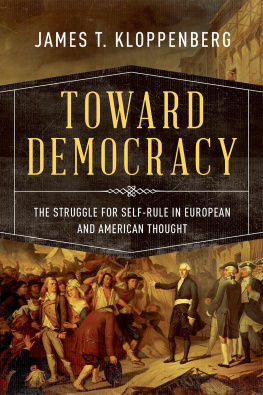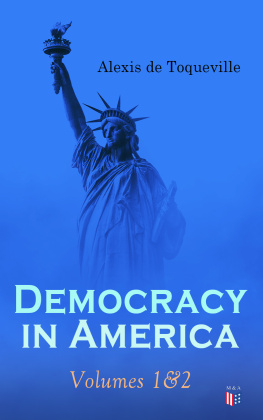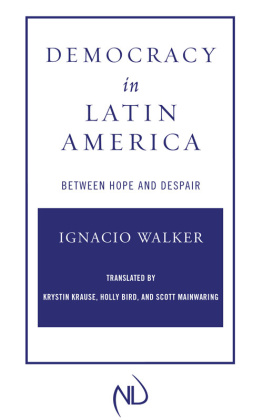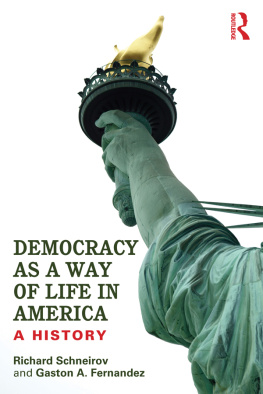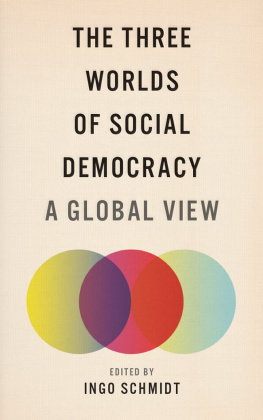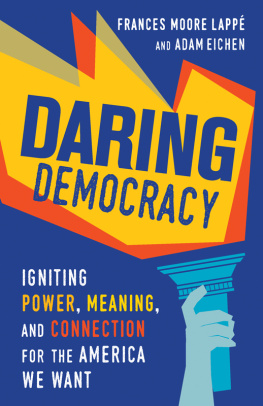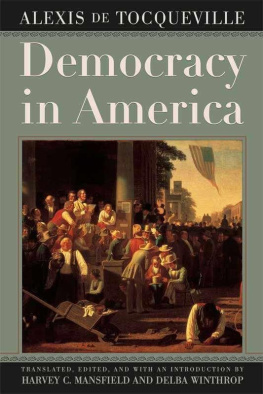Toward Democracy
Other Works by James T. Kloppenberg
Uncertain Victory:
Social Democracy and Progressivism in European and American Thought, 18701920
Oxford University Press, 1986
A Companion to American Thought
Co-edited with Richard Wightman Fox
Wiley-Blackwell, 1995
The Virtues of Liberalism
Oxford University Press, 1998
Reading Obama:
Dreams, Hope, and the American Political Tradition
Princeton University Press, 2011
The Worlds of American Intellectual History
Co-edited with Joel Isaac, Michael OBrien, and Jennifer Ratner-Rosenhagen
Oxford University Press, 2016

Oxford University Press is a department of the University of Oxford. It furthers the Universitys objective of excellence in research, scholarship, and education by publishing worldwide. Oxford is a registered trade mark of Oxford University Press in the UK and certain other countries.
Published in the United States of America by Oxford University Press 198 Madison Avenue, New York, NY 10016, United States of Americ
James T. Kloppenberg 2016
All rights reserved. No part of this publication may be reproduced, stored in a retrieval system, or transmitted, in any form or by any means, without the prior permission in writing of Oxford University Press, or as expressly permitted by law, by license, or under terms agreed with the appropriate reproduction rights organization. Inquiries concerning reproduction outside the scope of the above should be sent to the Rights Department, Oxford University Press, at the address above.
You must not circulate this work in any other form and you must impose this same condition on any acquirer.
Library of Congress Cataloging-in-Publication Data
Names: Kloppenberg, James T., author.
Title: Toward democracy : the struggle for self-rule in European and American thought / James T. Kloppenberg.
Description: Oxford ; New York : Oxford University Press, [2016] | Includes bibliographical references and index.
Identifiers: LCCN 2015033581 | ISBN 9780195054613 (acid-free paper)
ebook ISBN 9780190457686
Subjects: LCSH: DemocracyHistory. | DemocracyEurope. | DemocracyUnited States. | Autonomy.
Classification: LCC JC421 .K526 2016 | DDC 321.8dc23
LC record available at http://lccn.loc.gov/2015033581
1 3 5 7 9 8 6 4 2
Printed by Sheridan Books, USA
For Mary
Forever
Contents
this book is the result of a decision made twenty years ago. I had written a book about the intellectual revolution that lay behind the emergence of the liberal capitalist welfare states of our own day: Uncertain Victory: Social Democracy and Progressivism in European and American Thought, 18701920 (Oxford, 1986). That book sought to explain why thinkers who rejected revolutionary socialism and laissez-faire liberalism turned toward more moderate approaches to political reform, which in turn fell out of favor in the wake of World War I. After the catastrophic interval of 191445, revised versions of social democracy and progressivism emerged to define North Atlantic politics for the half century following World War II. After the publication of Uncertain Victory, I spent a decade trying to decide whether to follow that story forward to the present or back toward the beginnings of democracy. I wrote articles on American thought in the late eighteenth century, on Tocquevilles visit to the United States in the 1830s, and on mid- to late-twentieth-century European and American politics and ideas, which came together in my book The Virtues of Liberalism (Oxford, 1998).
Still trying to understand why the liberal democratic welfare states of the present had taken such different shapes, and why they failed to address the persistent problems of inequality and injustice, I decided to plunge into the deeper past. Although I thought at first that this book would focus on the North Atlantic in the nineteenth century, I found myself drawn further back. The explanation for the different outcomes of eighteenth-century democratic revolutions, I came to believe, lay in the wars of religion ignited by the sixteenth-century Protestant Reformation, the dynamics and consequences of which could be understood only with reference to religious as well as political developments rooted in Athens, Jerusalem, and Rome. I became convinced that the effects of those earlier struggles were still reverberating in the twenty-first century. If the story told in this book begins earlier than I expected twenty years ago, its significance extends to our own day even more clearly than I imagined.
I have not changed my mind about the argument advanced in Uncertain Victory concerning the 18701920 period, nor do I think the struggles against dogma and for democratic inquiry and experimentation initiated during those years have been completed. It is certainly true that we have inherited the attempts of social democrats and progressives a century ago to extend the meaning of democracy from the political to the social and economic spheres. It is equally true, however, and less often acknowledged, that we have inherited the results of the unsuccessful attempts made in the nineteenth century to end regimes of economic, racial, and ethnic inequality, and the exclusion from power of women by men. Those forms of hierarchy, descended from ancient assumptions, hardened into distinct systems of white male supremacy on both sides of the Atlantic even as forms of self-rule were taking shape during the eighteenth and nineteenth centuries. Those assumptions and hierarchies continue to inflect European and American cultures today. This book is a study of the aspirations and achievements of thinkers who championed democracy through the end of the nineteenth century, the obstacles they faced, the conflicts they failed to resolve, and the unanticipated consequences of their struggle.

Completing a book of this magnitude takes a lot of time and a lot of help. I am happy to acknowledge the support of fellowships from the American Council of Learned Societies, the John Simon Guggenheim Foundation, and the National Endowment for the Humanities. I also want to thank the Nominating Committee for the Pitt Professorship, and the Fellows of Jesus College, University of Cambridge, for a memorable year in 20089; the Ecole des Hautes Etudes en Sciences Sociales, Paris, for an equally memorable spring in 2013; and, at Harvard, the assistance of the Cabot Fellowship, the Center for American Political Studies, the Center for European Studies, the Charles Warren Center for Studies in American History, the Mahindra Humanities Center, and the Radcliffe Institute for Advanced Study.
I am grateful to those who invited me to present my ideas about democracy, and those who discussed the topic with me, at the following colleges and universities: Brandeis, Cambridge, Catholic, Colby, Columbia, CUNY Graduate Center, Dartmouth, Denison, Dresden, Ecole des Hautes Etudes en Sciences Sociales, Free University of Berlin, Institut dEtudes Politiques (Sciences Po) in Paris, London (University College), Northwestern, Notre Dame, Nottingham, Ohio State, Oklahoma, Oxford, Rennes, Sheffield, Stanford, Sussex, Tokyo, Toronto, Turin, Vienna, Virginia, Washington University (St. Louis), and Yale; and also the Phillips Andover Academy, the Roxbury Latin School, St. Marks School, the National Humanities Center in North Carolina, and the Woodrow Wilson Center in Washington, DC. Over the years I have relied on the splendid research staffs and extraordinary collections of libraries at Harvard, Cambridge, and Oxford, the American Antiquarian Society, the Boston Public Library, the British Library, the French National Archives, the French National Library, the Library of Congress, and the Massachusetts Historical Society.

